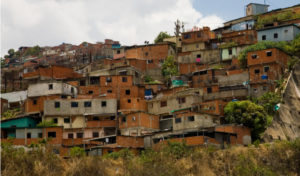After the socialist government of Hugo Chavez rose to power in Venezuela, it began distributing more of the country’s wealth to welfare programs and sympathetic socialist regimes in nearby Latin American countries. However, when oil prices fell, the government began running out of money and the consequences of building a state on a foundation funded by a cyclical commodity became clear immediately. Al Jazeera’s Patricia Sabga reports:
Venezuela has the largest proven oil reserves in the world and the government depends on crude exports for the lion’s share of its income and foreign currency.
Like many petrostates, Venezuela has struggled to diversify its economy, leaving it vulnerable to boom-bust cycles.
When oil is expensive, government coffers overflow. When it’s cheap, they empty.
Rising crude prices in the 2000s helped the late president, Hugo Chavez, make good on his pledge to harness the nation’s oil wealth to fund welfare programmes aimed at redressing inequality and poverty.
But when oil prices started to plummet in 2014, the new government of his successor, Maduro, was ill-prepared to absorb the blow.
“They didn’t’ save up for a rainy day,” Atlantic Council deputy director Paula Garcia Tufro told Al Jazeera. “They didn’t make the long term investments.”
That was especially true of the country’s oil sector. When Chavez took power, Venezuela pumped roughly 3.5 million barrels of oil per day. Production has since collapsed to less than one-third of that.
Oil is a capital-intensive business. To secure future production, Venezuela needed to reinvest an adequate portion of windfalls from flush years into its state-owned oil company, Petróleos de Venezuela, or PDVSA.
“If you talk to experts who have long worked on and followed the oil sector in Venezuela they will tell you there was significant technical expertise in the past and those experts are just not there any more,” said Garcia Tufro.
Read more here.





